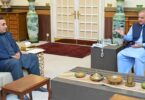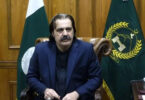Dr. Usman Quddus
Democracy is a phenomenon that is categorized as people’s rule. It involves civic participation through voting. Democracy is also understood as opposed to authoritarianism and totalitarianism.
Authoritarianism is concentrated power in the hands of a single ruler or a small group of individuals, and they exercise significant control over the government and society.
Totalitarianism on the other hand is an extreme form of authoritarianism where the government seeks to exert total control over all aspects of public and private life. Totalitarian regimes typically suppress opposition, manipulate information, and demand unwavering loyalty to the ruling party or leader. In a totalitarian system, individual freedoms and human rights are severely restricted.
Fascism, dictatorship, and the like terms are derivative of authoritarian and totalitarian regimes. The quote “It’s not democracy that fails, it’s the people that fail” attributed to George Bernard Shaw, the Irish playwright, critic, and public intellectual is very apt for Pakistan in today’s times. The Pakistani democratic scene with the major political parties is dominated by authoritarianism and nepotism all the way while the political parties decry the lack of democracy.
Fingers in the political dispensation of Pakistan are pointed towards the establishment for interference in public mandate but the political parties themselves fail to reform themselves for the self-serving interests of their leadership. This is a hypocritical standpoint of political forces in Pakistan as they are themselves the harbinger of authoritarianism and wish to trade one undemocratic force for the other. All the party chairmen of political parties are lifetime holders of such office of ‘chairman’ contrary to democratic principles.
Even the claimed anti-status quo party ‘Tahreek Insaf ‘has Imran Khan as the lifetime chairman. Nepotism further contributes to the phenomenon of authoritarianism and totalitarianism in the democratic dispensation of Pakistan as major party positions are dominated by kinship ties. There is no provision in law barring direct entry of sons and daughters of party heads as party supremos and their consequent re-election to premier positions. Thus, party politics in Pakistan is being run mostly on the patron of royal ascensions with a party’s chairman progeny inheriting the headship directly with no resistance. This speaks volumes about the prevalent totalitarianism within the political parties in Pakistan.
Moreover, the reserved seats are distributed mostly based on kinship to a major political player rather than merit considerations. This can be verified by enquiring about the kinship ties of many women candidates who are chosen for such seats. Democracy is symbolic of the rule of law, human rights, and accountability while deprecating despotism, dictatorship, and aristocracy.
People of Pakistan have over time strived hard for the ideal of democracy, however, the cherished ideal is far from nigh. It is imperative considering Pakistan’s failing experiment with sham democracy during different time periods. Successive governments have failed over time in Pakistan with cult following at its peak and the condition of people at large becoming poorer with the deterioration of every institution. New leadership can bring solace to Pakistan with invigorating ideas for ameliorating the miseries of people.
This requires limiting terms for the chief executive in Pakistan to bring new leadership at repeated intervals just like in the case of the U.S.A. where democracy has performed at its brightest. Moreover, restricting terms for the chief executive will require only a slight modification to the constitutional system in Pakistan while greatly aiding the cherished dream of democracy. Saying this, it is mandatory that undemocratic forces do not intervene in such a scenario to limit the tenure of the office of prime minister.
The other reform that may benefit the constitutional setup of Pakistan can be limiting the tenure of premiership from five years to four years as it is repeatedly seen in Pakistan’s political scenario that people feel regarding the majority party becoming hegemonic after a certain period consequently non-democratic forces step in to end the tenure of chief executive. For the lack of democracy, only political parties are to blame themselves.
An important reason for the lack of democratic values in Pakistan is that democratic forces let them get used by the establishment. One such instance is the passing of an amendment to section 500 PPC on defamation that pertains to punishment for ridiculing the army. There is no doubt that Pakistan occupies a strategic place in world politics where the army is of cardinal importance to Pakistan. However, it would have been better if an amendment to PPC was made prescribing punishment for discrediting the army in times of war only.
This would have served democratic values which were promised by the founding fathers on the creation of Pakistan. Stifling objective debate on the performance of armed forces is manifestly against the fundamental right to speech. Moreover, there is no bar in Pakistan on the armed forces to perpetuate their narrative. The phenomenon of thesis, anti-thesis, and conclusion as presently not allowed to perpetuate in Pakistan certainly contributes to totalitarianism which in the long run will affect every segment of society.
The Islamic Republic of Pakistan was promised the ideal of democracy. However, the words of Faiz Ahmad Faiz still ring true that the promised moment has still not come. The lack of democracy and democratic norms in Pakistan is primarily due to the political parties themselves that are not willing to enforce democracy on themselves while carrying out appropriate reforms. It is not surprising that most of the dictators were more democratic than the politicians including the likes of Ayub Khan openly acknowledging the freedom to speech against him by Justice Kayani.
Prime Minister Kakar recently visited LUMS and open-heartedly accepted the responses. The same kind of attitude is hoped one day to be adopted by all our party supremos who remain mostly aloof to middle-class responses. Democracy is an attitude of consultation and deprecating of authoritarianism.
All the institutions of Pakistan should adopt this attitude while deprecating one-man showmanship. However, it is hoped that the lead one day comes from the major political forces in Pakistan.
The writer teaches Constitutional Law at the University of Swabi and can be reached on; usmanquddus1980@gmail.com







